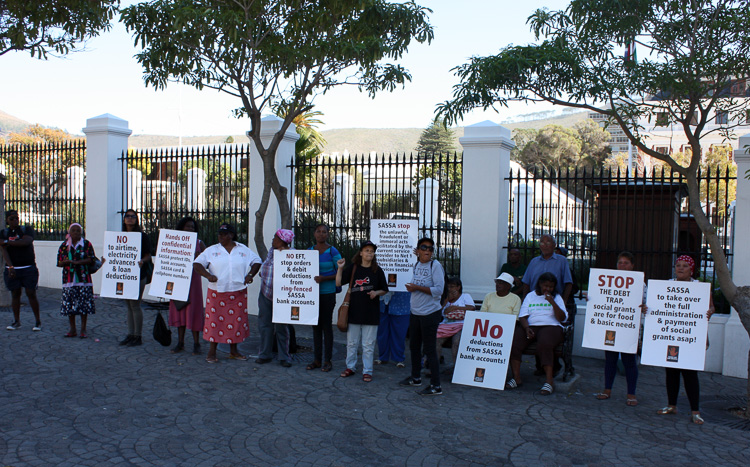

A protest outside Parliament in April against social grant deductions. Archive photo: Trevor Bohatch
27 November 2017
A dispute has erupted over the profits declared by Cash Paymaster Services (CPS), the company that pays social grants.
In 2014, the Constitutional Court found that the CPS contract with the South African Social Security Agency (SASSA) was invalid. It was impractical to end the contract immediately, so the court gave the go-ahead for CPS to continue paying grants until March 2017. But the court said that CPS “has no right to benefit from an unlawful contract”. So it ordered CPS to file an audited statement of its expenses, income and profit once the contract was finished.
CPS is owned by Net1 and is responsible for paying approximately 17 million social grant beneficiaries monthly.
CPS submitted its statement in May this year. It was audited by KPMG. In the statement, CPS declared profit-before-tax of just over R1.09 billion over the five years ended 30 March 2017 and a net profit of R705 million.
But a report submitted to the Constitutional Court by the Auditor-General and a Panel of Experts raised concerns over the CPS accounts. The Panel noted that over the contract period, Net1 had been paid more than R1 billion in “patent and licensing fees” by CPS, a company in which it has an 87.5% stake. This was listed as an expense in CPS’s books and was therefore deducted from its revenue.
The Panel of Experts’ report also stated that CPS and Net1 had three significant sources of income that were are not included in the profit declaration:
Interest earned on grant funds received from National Treasury;
Bank charges collected from beneficiaries for withdrawal of grants from non-CPS ATMs and banking services; and
Financial and insurance products sold to beneficiaries.
However, CPS has contested this. CPS says that some of the interest was returned, and that it is entitled to the rest of the interest. On the bank fees, CPS argued that the ATM fees covered cost of ATM “interchange fees”. As for products sold to grant beneficiaries, Net1 says these are separate businesses and CPS does not share SASSA data with them.
The Alternative Information & Development Centre (AIDC) was commissioned by Black Sash Trust and the Centre for Applied Legal Studies to conduct an independent analysis of CPS’s report to the court.
The AIDC suggested that CPS had understated its pre-tax profit by up to R614.4 million.
But Net1 immediately countered this and there has been a public back and forth between AIDC and Net1 over the past two weeks over the accuracy of the analysis.
In a statement, Net1 highlighted a significant error in the AIDC’s calculations. The company said the AIDC had mistakenly included as income under the current contract the sum of R800 million from services provided to SASSA before the current contract started on 1 April 2012. Dick Forslund, author of the AIDC report, acknowledged the error to GroundUp on Friday.
However, in a statement released on Monday, AIDC stood by its finding that “CPS has provided insufficient information to the Constitutional Court to draw a definite conclusion about how much CPS (and its fellow companies in South Africa) profited from the SASSA contract”.
AIDC also stood by some of its earlier calculations and cited the findings of the report by the Panel of Experts, including the R1 billion in patent and licensing fees to Net1, which, Forslund told GroundUp, was “a common way of shifting profits from a subsidiary to a mother company”.